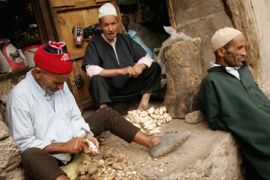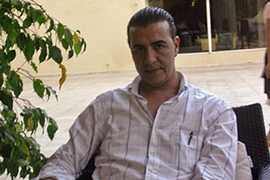Berber language gets an airing
After decades of ignoring Amazigh, Morocco has of late begun to pay attention.

 |
| At least 30 per cent of Moroccans speak one of the three Berber languages [GALLO/GETTY] |
Killing off the language of the conquered has been a priority for invaders since mankind graduated from the mere exchange of grunts and signs.
The Berbers of North Africa found themselves at the receiving end when Arabs overran their turf in the seventh century. Their Amazigh tongue fared no better than countless other languages driven underground by defeat on the battlefield.
While some languages and nations are erased over time, some persist and live on the margins. Such is the case of the Berbers and their language.
| Who Are the Berbers? |
|
The North African coast was known as Barbary (from the Latin word for foreigners), and its inhabitants were the people now known as Berbers. Today, they number about 20 million and call themselves Imazaghen, which means “free and noble men”. Spread across Morocco, Algeria, Tunisia and, to a lesser extent, Libya and Egypt, they were conquered during the Arab invasion that started in the seventh century. In later centuries, Berbers stubbornly resisted domination but were eventually put down by the French, who ruled most of Morocco from 1912 to 1956. Through the centuries, Berbers have mixed with so many other ethnic groups, notably the Arabs, that they are now identified usually on a linguistic rather than racial basis. Berber languages form a branch of the Afro-Asiatic linguistic family and comprise about 26 closely related languages, including Tachelhit, Central Atlas Tamazight, and Kabyle. Many Berbers are bilingual in Arabic. |
At least 30 per cent of the country’s population still considers one of the three Berber languages their mother tongue.
Despite this, the Berbers are treated like a minority by members of the dominant Arab culture when it comes to promoting their culture and language.
Berbers are mostly Muslim, ethnically mixed and spread across the country – from the Rif mountain range in the north to the Atlas mountains, and the desert in the south. For this reason, language is all-important to the Berbers, uniting their pluralistic culture.
Berber calls to re-examine Moroccan society have grown louder since controls on political expression were loosened by the ascension of Mohammed VI to the throne in 1999.
And the effect: After decades of ignoring the existence of Amazigh, Morocco has of late begun to pay it some attention.
The king has promised to set up a body to preserve the Berbers’ language and culture to “strengthen the pillars of our ancestral identity”, bearing in mind “the need to give a new impulse to our Amazigh culture, which is a national treasure”.
While this change in attitude has been welcomed, there has been calls against viewing the issue through a political or racial prism.
“Talking about Amazigh is talking about history, culture, race, people, language and politics,” says Jamal Benaissa, a Moroccan history researcher.
“If you consider it from the perspective of language, culture and history, it adds value to Moroccan diversity. But if seen from a political or racial angle, it can become a curse that threatens the unity of our society.”
Demands for the recognition of Amazigh have been derided in the past as a colonial plot to divide the Arab country.
And not surprisingly, the opening of the airwaves to the Berber language has not found favour with everyone.
Across the air waves
|
Elections 2007 |
Abderrahman Adawi, chairman of Radioplus, which broadcasts both in Arabic and Amazigh, says: “The use of this language is mainly to be as close as possible to the listeners and be sure that the messages are well understood by every category of the population among which an important part does not speak or understand Arabic.”
Adawi’s 24-hour radio station dedicates 10 hours a day to Amazigh.
“We try to balance between the two languages, yet we are criticised by audiences for both,” Adawi says.
“The Berbers accuse us of not doing enough and want more time given to Amazigh. The Arabs blame us for giving too much time and attention to Amazigh.”
The station is one of the 10 private radio stations that have taken advantage of the government’s move to liberalise the broadcast media.
Based in Agadir, the capital city of the Berber-majority Souss region, Radioplus programmes deal with local issues such as education and the environment. Seventy per cent of its employees are Berbers. Working in the media for the first time, they had to be trained by specialists in Casablanca.
 |
| Adawi, who heads Radioplus, said the station tries to strike a balance between both languages |
But elsewhere in the broadcast spectrum, Amazigh is still a weak signal.
One government-affiliated television channel, 2M, broadcasts in a mix of Arabic, French and Amazigh. The other, RTM, broadcasts predominantly in Arabic, with only five to 10 minutes a day of news in Amazigh.
Dubbing the use of Amazigh as a colonial plot can be traced back to Arabic’s loss of influence during the French colonial period.
But after Morocco gained its independence in 1956, the Arabic language rode the waves of nationalism, to come back with a vengeance.
In the 1970s, the government launched a campaign to impose stricter standards for the use of Arabic in place of French in government and education.
‘Arabisation’
Berber activists say the “Arabisation” of Morocco has led to discrimination and has marginalised their people.
They blame Arabisation for the high illiteracy rate in Morocco. More than half of its citizens cannot read because Berber children often drop out when confronted with teachers who speak only Arabic.
Even in schools in predominantly Berber areas, lessons are taught in Arabic. Government jobs are off-limits to those who speak only Amazigh.
In a speech in 2001 to mark the second anniversary of his accession to the throne, Mohammed VI spoke of integrating the Berbers into the education system.
 |
| Beaissa says some have gone too far in their demands for Amazigh to be recognised |
But many Berber organisations denounce the education charter. They point out that only two of its 100 articles deal with the question of Amazigh in school.
The first article says Amazigh could be used in primary school, but only to “facilitate the learning of the official language”, Arabic.
The second says that certain universities would have the means to study Amazigh and Berber culture.
Not all Berbers are in agreement on the push for identity.
“After the creation of the Royal Institute for Amazigh Culture, some Berbers have gone too far in their demands. Some hardliners now say that Arabs are not the indigenous people of Morocco and hence want Amazigh to be the official language of the country,” says Benaissa.
Moderates worry that calls by hardcore activists for a political party exclusively for Berbers would be seen as separatism and could harm their movement. They fear that it may lead to a confrontation, such as the incidents that took place in Kabyle, Algeria in recent years.
“In Berber-majority cities, Arabs who do not speak Amazigh feel discriminated against because most Berbers insist on talking to you in their language though they speak Arabic,” says Benaissa.
“God forbid, we don’t want Morocco to become another Iraq or Sudan.”

